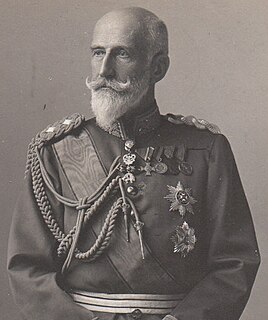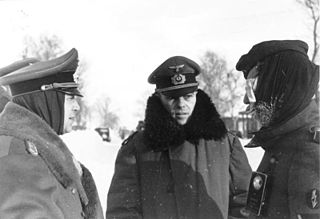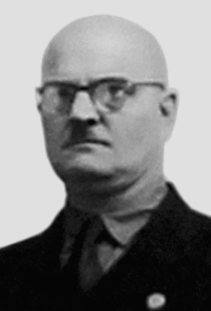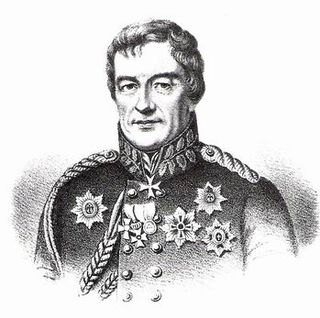 W
WAlbrecht, Duke of Württemberg was the last Württemberger crown prince, a German military commander of the First World War, and the head of the House of Württemberg from 1921 to his death.
 W
WAlexander Christian Frederick, Count of Württemberg was a German army officer and poet. He was the eldest surviving son of William Frederick Philip, Duke of Württemberg, who was a younger brother of Frederick I of Württemberg
 W
WPaul von Bruns was a German surgeon. He was born in Tübingen, and was the son of surgeon Victor von Bruns. His father-in-law was Protestant theologian Karl Heinrich Weizsäcker.
 W
WCarl Rudolf was third and last Duke of Württemberg-Neuenstadt, army commander in Danish service and Field Marshal of the Holy Roman Empire.
 W
WKurt Eberhard was a German Nazi officer. He rose to the rank of Brigadeführer of the SS and in the German army. During World War II Eberhard was given the command over the occupied city of Kiev in Ukraine. He was involved in planning and supervising the Babi Yar massacres during which over 33,771 people were murdered. He was captured by US authorities after the end of World War II, in November 1945, and kept in captivity in Stuttgart. He committed suicide on September 8, 1947.
 W
WWalther Fischer von Weikersthal was a German general in the German Army during World War II. A career officer who also served in the Army of Württemberg in World War I and the Weimar Republic's Reichswehr, Weikersthal was a recipient of the Knight's Cross of the Iron Cross.
 W
WLeo Dietrich Franz Reichsfreiherr Geyr von Schweppenburg, was a German general during World War II, noted for his pioneering stance and expertise in the field of armoured warfare. He commanded the 5th Panzer Army during the Invasion of Normandy, and later served as Inspector General of Armoured Troops. After the war he was involved in the development of the newly built German Army (Bundeswehr).
 W
WCurt Haase was a German general (Generaloberst) in the Wehrmacht during World War II. He commanded the III Corps during the Invasion of Poland and France. He later commanded the 15th Army in German-occupied France from January 1941 to November 1942.
 W
WGottlieb Hering was an SS commander of Nazi Germany. He served in Action T4 and later as the second and last commandant of Bełżec extermination camp during Operation Reinhard. Hering directly perpetrated the genocide of Jews and other peoples during The Holocaust.
 W
WHermann George Bernard of Saxe-Weimar-Eisenach was Prince of Saxe-Weimar-Eisenach and Duke of Saxony, and a general in the Württemberger army.
 W
WHermann Köhl was a German aviation pioneer and pilot of the first transatlantic flight by a fixed-wing aircraft from East to West.
 W
WDietrich Kraiss was a German general during World War II. He was a recipient of the Knight's Cross of the Iron Cross with Oak Leaves of Nazi Germany.
 W
WErich Marcks was a German general in the Wehrmacht during World War II. He authored the first draft of the operational plan, Operation Draft East, for Operation Barbarossa, the invasion of the Soviet Union, advocating what was later known as A-A line as the goal for the Wehrmacht to achieve, within nine to seventeen weeks. Marcks studied philosophy in Freiburg in 1909.
 W
WDuke Philipp of Württemberg was a German prince, head of the Roman Catholic cadet branch of the dynasty which ruled the Kingdom of Württemberg.
 W
WWalther Gustav Reinhardt was a German officer who served as the last Prussian Minister of War and the first head of the army command within the newly created Ministry of the Reichswehr of the Weimar Republic. During the Kapp Putsch of 1920, Reinhardt remained loyal to the elected government and was one of the few senior officers of the Reichswehr willing to order troops to fire at the revolting units.
 W
WJohannes Erwin Eugen Rommel was a German general and military theorist. Popularly known as the Desert Fox, he served as field marshal in the Wehrmacht of Nazi Germany during World War II, as well as serving in the Reichswehr of the Weimar Republic, and the army of Imperial Germany.
 W
WRichard Ruoff was a general in the Wehrmacht of Nazi Germany during World War II. He commanded the 4th Panzer Army and the 17th Army on the Eastern Front.
 W
WHans Speidel was a German general, who was one of the major military leaders of West Germany during the early Cold War. The first full General in West Germany, he was a principal founder of the Bundeswehr and a major figure in German rearmament, integration into NATO and international negotiations on European and Western defence cooperation in the 1950s. He served as Commander of the Allied Land Forces Central Europe (COMLANDCENT) from 1957 to 1963 and then as President of the German Institute for International and Security Affairs from 1964.
 W
WRudolf Veiel was a German general during World War II.
 W
WHermann-Eberhard Wildermuth was a German politician and a member of the FDP/DVP. From 1949 until his death he was the Federal Minister for Housing under Konrad Adenauer. During World War II Wildermuth was a highly decorated colonel in the Wehrmacht and was awarded the Knight's Cross of the Iron Cross. He was a grandson of the Swabian writer Ottilie Wildermuth.
 W
WCount Friedrich Wilhelm Alexander Ferdinand of Württemberg, 1st Duke of Urach, was the son of Duke Wilhelm of Württemberg (1761–1830), younger brother of King Frederick I of Württemberg, by his morganatic wife, Baroness Wilhelmine von Tunderfeldt-Rhodis (1777–1822), who had married in 1800. He was the first Head of the House of Urach.
 W
WChristian Wirth was a German SS officer and Holocaust perpetrator who was one of the leading architects of the program to exterminate the Jewish people of Poland, known as Operation Reinhard. His nicknames included Christian the Cruel and The Wild Christian.
 W
WJustus Philipp Adolf Wilhelm Ludwig Freiherr von Wolzogen was a Württembergian military officer, who served during the Napoleonic Wars.
 W
WDuke Eugen of Württemberg was a German prince and a staff officer of Württemberg.